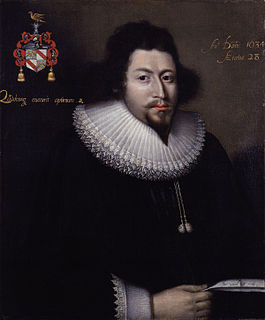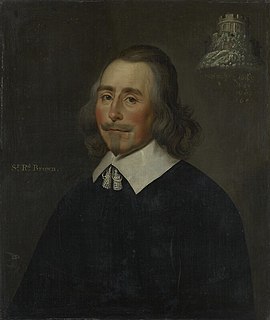Rowland Wilson (1613 – 19 February 1650) was an English politician who sat in the House of Commons between 1645 and 1650. He fought in the Parliamentary army in the English Civil War.

The House of Commons of England was the lower house of the Parliament of England from its development in the 14th century to the union of England and Scotland in 1707, when it was replaced by the House of Commons of Great Britain. In 1801, with the union of Great Britain and Ireland, that house was in turn replaced by the House of Commons of the United Kingdom.

The English Civil War (1642–1651) was a series of armed conflicts and political machinations between Parliamentarians ("Roundheads") and Royalists ("Cavaliers") over, principally, the manner of England's governance. The first (1642–1646) and second (1648–1649) wars pitted the supporters of King Charles I against the supporters of the Long Parliament, while the third (1649–1651) saw fighting between supporters of King Charles II and supporters of the Rump Parliament. The war ended with the Parliamentarian victory at the Battle of Worcester on 3 September 1651.
Wilson was son of Rowland Wilson (died 16 May 1654) of Gresegarth and London, and his wife Mary Tiffin, daughter of John Tiffin of London. His father was a wealthy merchant of the City of London. Wilson was a member of the Worshipful Company of Vintners. During the civil war he was lieutenant-colonel of the orange regiment of the London trained bands, and commanded it in October 1643. He joined the army of the Earl of Essex after the First Battle of Newbury, and took part in the occupation of Newport Pagnell. [1]

The City of London is a city and county that contains the historic centre and the primary central business district (CBD) of London. It constituted most of London from its settlement by the Romans in the 1st century AD to the Middle Ages, but the agglomeration has since grown far beyond the City's borders. The City is now only a tiny part of the metropolis of London, though it remains a notable part of central London. Administratively, it forms one of the 33 local authority districts of Greater London; however, the City of London is not a London borough, a status reserved for the other 32 districts. It is also a separate county of England, being an enclave surrounded by Greater London. It is the smallest county in the United Kingdom.

The Worshipful Company of Vintners is one of the most ancient Livery Companies of the City of London, England, thought to date back to the 12th century. It is one of the "Great Twelve" livery companies of London, and its motto is Vinum Exhilarat Animum, Latin for "Wine Cheers the Spirit". One of the more peculiar rights of the Company involves the ceremony of swan upping.

The First Battle of Newbury was a battle of the First English Civil War that was fought on 20 September 1643 between a Royalist army, under the personal command of King Charles, and a Parliamentarian force led by the Earl of Essex. Following a year of Royalist successes in which they took Banbury, Oxford and Reading without conflict before storming Bristol, the Parliamentarians were left without an effective army in the field. When Charles laid siege to Gloucester, Parliament was forced to muster a force under Essex with which to beat Charles' forces off. After a long march, Essex surprised the Royalists and forced them away from Gloucester before beginning a retreat to London. Charles rallied his forces and pursued Essex, overtaking the Parliamentarian army at Newbury and forcing them to march past the Royalist force to continue their retreat.
In 1645, Wilson was elected Member of Parliament for Calne in the Long Parliament. [2] He became an alderman of the City of London for Bridge ward on 28 November 1648. He was elected Councillor of State in 1649 and was nominated as a judge for the trial of King Charles in 1649 but did not act. He became Sheriff of London in July 1649 and was re-elected to the Council of State in 1650. [3]
Calne was a parliamentary borough in Wiltshire, which elected two Members of Parliament (MPs) to the House of Commons from 1295 until 1832, and then one member from 1832 until 1885, when the borough was abolished.

The Long Parliament was an English Parliament which lasted from 1640 until 1660. It followed the fiasco of the Short Parliament which had convened for only three weeks during the spring of 1640, and which in turn had followed an 11-year parliamentary absence. In September 1640, King Charles I issued writs summoning a parliament to convene on 3 November 1640. He intended it to pass financial bills, a step made necessary by the costs of the Bishops' Wars in Scotland. The Long Parliament received its name from the fact that, by Act of Parliament, it stipulated it could be dissolved only with agreement of the members; and, those members did not agree to its dissolution until 16 March 1660, after the English Civil War and near the close of the Interregnum.
Wilson married Mary Carleton, daughter of Bigley Carleton. [1] She later married Bulstrode Whitelocke as his third wife. [4]

Sir Bulstrode Whitelocke was an English lawyer, writer, parliamentarian and Lord Keeper of the Great Seal of England.

